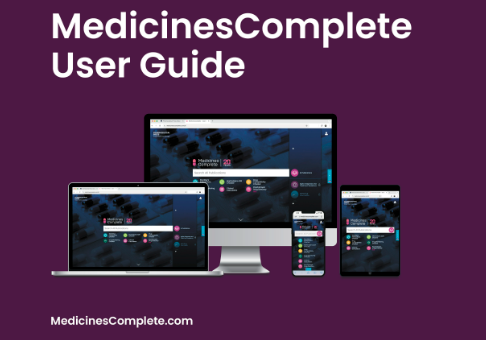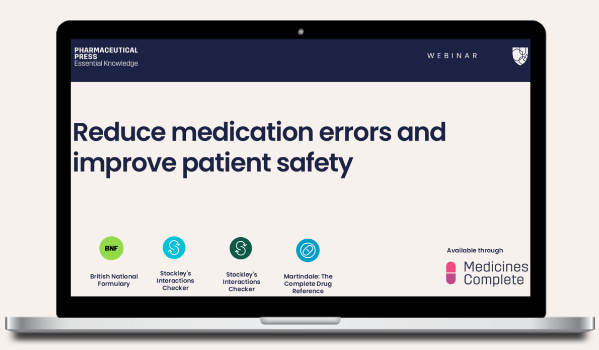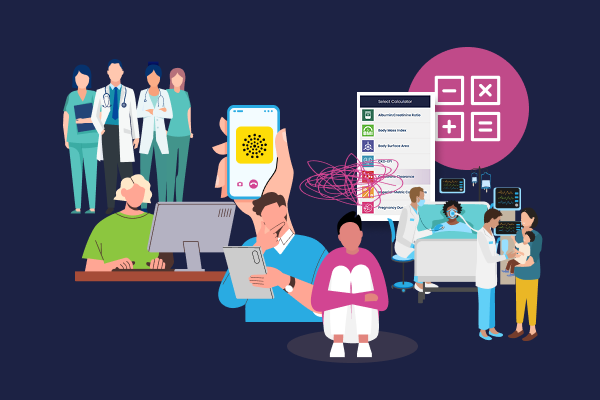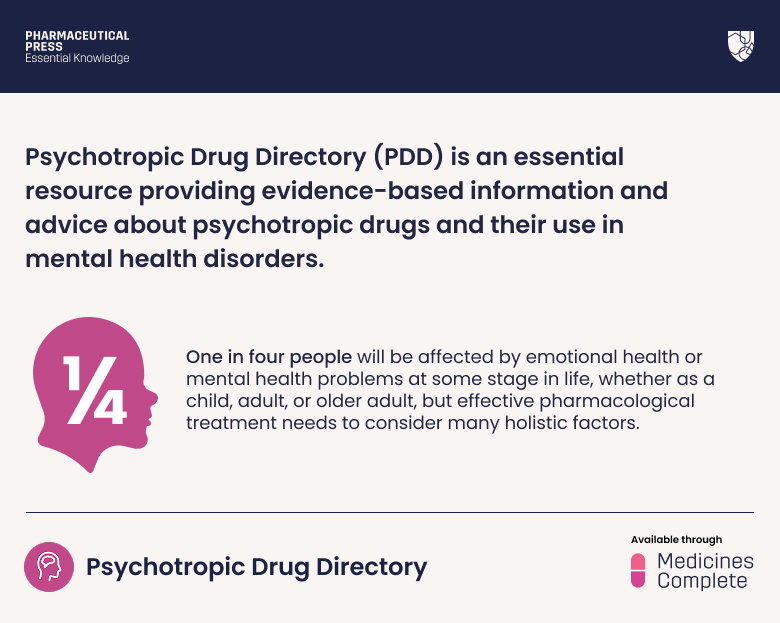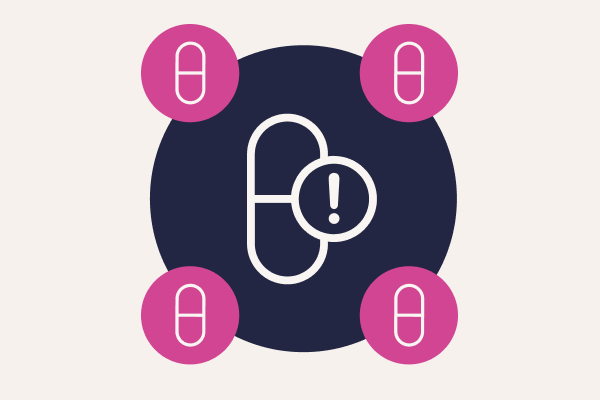Drug prescribing informationAn article on where to find reliable drug prescribing information for mental health
• What is Psychotropic Drug Directory?
• Where can you access reliable prescribing information on psychotropic drugs?
• What makes Psychotropic Drug Directory unique?
• Who can benefit from using Psychotropic Drug Directory?
What is Psychotropic Drug Directory?
Psychotropic Drug Directory (PDD) is an essential resource providing evidence-based information and advice about psychotropic drugs and their use in mental health disorders.
Access to mental health information is becoming more important as awareness of conditions amongst the general population grows. One in four people will be affected by emotional health or mental health problems at some stage in life,¹ whether as a child, adult, or older adult, but effective pharmacological treatment needs to consider many holistic factors.
Individuals will respond differently to treatment and have other conditions or life events going on, and this can affect the doses they require, whether they adhere to treatment, or whether they need to try uncommon options.
Please complete the form at the bottom of this article to request a complimentary trial of MedicinesComplete.
To navigate this complex landscape, PDD includes information on unlicensed mental health drugs and uses, a variety of psychotropic substances such as cannabinoids, and situations or conditions where they might best be used.
PDD supports both primary and secondary care needs, with guidance on general principles and best practice, providing a curated list of literature and key resources, and quick-read practical summary tables.
PDD is unique in that it aims to present an unbiased summary of the evidence base, allowing the clinician to make an informed decision appropriate to their specific clinical situation. Direct links to the original references are readily given for further investigation.
PDD began as an aide-mémoire or ‘pocket handbook’ by Stephen Bazire in 1989, whilst specialising in mental health in the NHS. As the publication grew, he was joined by Nicola Greenhalgh, and most recently Pharmaceutical Press’ Editorial Team, after PDD was acquired and made available digitally via MedicinesComplete.
The Editorial Team continue to use their expert knowledge and experience to provide high-quality mental health drug information and advice.
Now available on MedicinesComplete, PDD is regularly updated to ensure that new, relevant information is accessible.
Download our Psychotropic Drug Directory user guide.
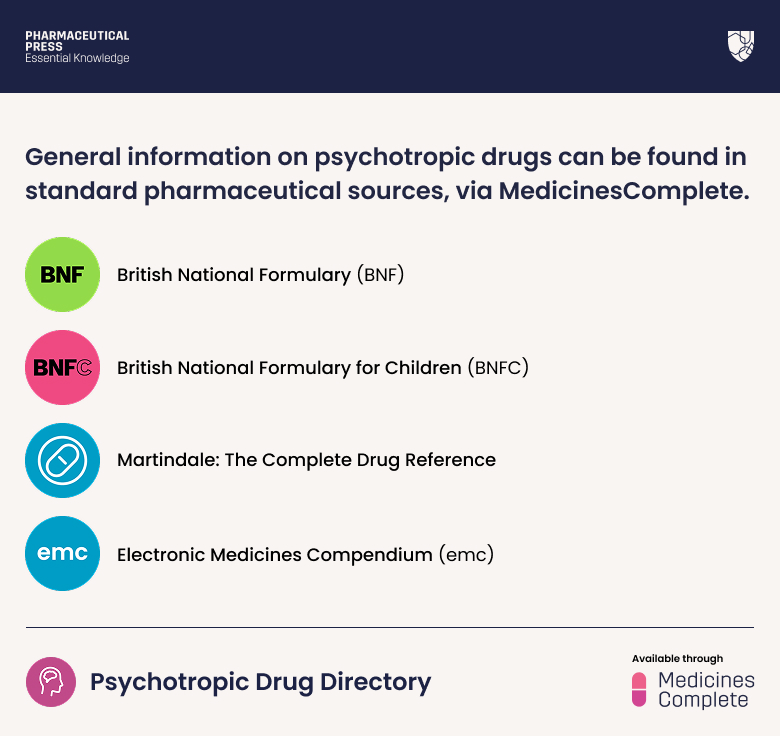
Where can you access reliable prescribing information on psychotropic drugs?
General information on psychotropic drugs can be found in standard pharmaceutical sources, such as British National Formulary (BNF), British National Formulary for Children (BNFC), Martindale: The Complete Drug Reference, and Electronic Medicines Compendium (emc). These provide detail on licensed indications, associated doses, manufacturer information on side effects, cautions, contra-indications, supply, and safety information.
However, mental health is a complex, dynamic, and evolving field. PDD is a specialist resource focusing on mental health and the nuances of practice that occur beyond manufacturer information.
MedicinesComplete provides an integrated platform for specialist and generalist sources, allowing for quick, point-of-care access. All publications listed above can be found on MedicinesComplete, with navigation to related content between them accessible via a side panel. When used together, they provide a detailed insight into the drug or condition and help tailor care to the patient.
As an example, let’s look at the information provided on valproate and sodium valproate in MedicinesComplete. To avoid confusion, please note that BNF and BNFC contain information on sodium valproate. BNF provides concise information on available sodium valproate products, its safety, and dosing. In Martindale: The Complete Drug Reference, expanded information, such as administration advice, can be found.
For more specialist queries, PDD provides insight on the use of valproate in unconventional conditions. Valproate is typically used in epilepsy however PDD shows it also has a place in bipolar disorder and electroconvulsive therapy which are lesser known and come with their own considerations.
Additionally, it outlines to users that there is little evidence for the use of valproate in treating PTSD. Where adjustments need to be considered in renal impairment and older adults, PDD highlights how this has been used safely in the literature.
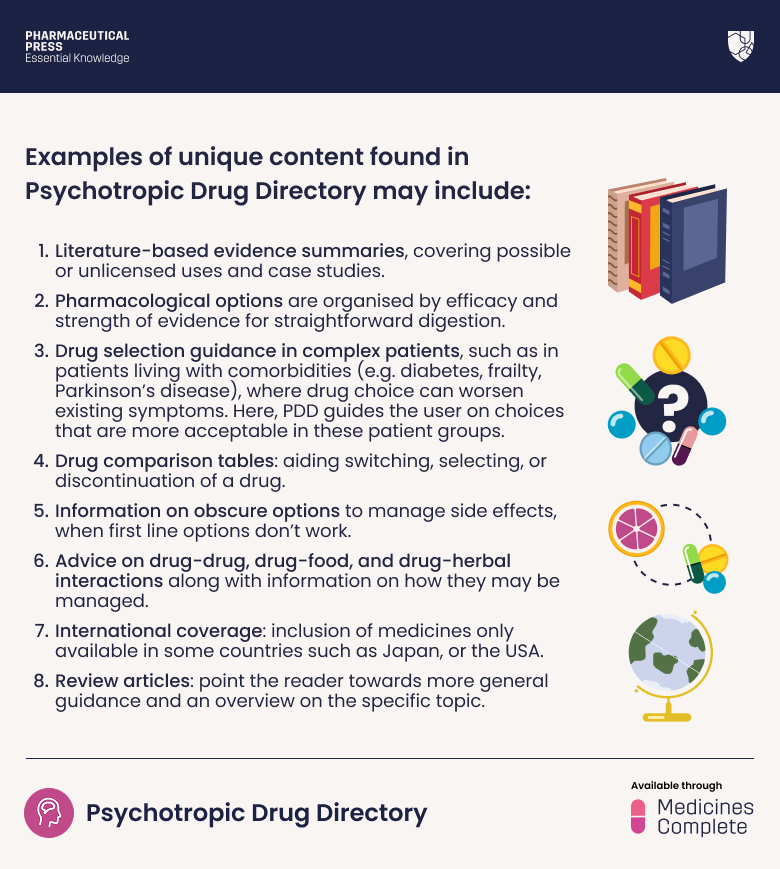
What makes Psychotropic Drug Directory unique?
PDD has a uniquely practical approach, centred around a first-hand perspective of the challenges facing mental health professionals. It provides advice encouraging the safe, optimal, and rational use of mental health drugs. PDD content is reviewed by health professionals to ensure it is relevant to clinical practice and offers real-world application.
Examples of unique content found in PDD may include:
- Literature-based evidence summaries, covering possible or unlicensed uses and case studies.
- Pharmacological options are organised by efficacy and strength of evidence for straightforward digestion.
- Drug selection guidance in complex patients, such as in patients living with comorbidities (e.g. diabetes, frailty, Parkinson’s disease), where drug choice can worsen existing symptoms. Here, PDD guides the user on choices that are more acceptable in these patient groups.
- Drug comparison tables: aiding switching, selecting, or discontinuation of a drug.
- Information on obscure options to manage side effects, when first line options don’t work.
- Advice on drug-drug, drug-food, and drug-herbal interactions along with information on how they may be managed.
- International coverage: inclusion of medicines only available in some countries such as Japan, or the USA.
- Review articles: point the reader towards more general guidance and an overview on the specific topic.
Who can benefit from using Psychotropic Drug Directory?
PDD is intended for health professionals involved in the care of patients experiencing mental health challenges; doctor, pharmacist, nurse, or other allied health roles. A core resource with international coverage, it is essential in mental health units, medicines information departments, hospitals, and GP practices.
PDD is written primarily with mental health patients as its focus; however, those with mental health conditions may also have other conditions (known as co-morbidities) which impact their day-to-day life and ability to engage with treatment or mental health services. PDD aims to support health professionals to make informed decisions in these patients with complex health issues; mental health treatment is not a one-size-fits-all, and it is common to need to trial different drugs, switch between them, and adjust doses.
Situations in which PDD may be of use include (but are not limited to):
Mental health reviews:
- In these situations, first or even third-line options may have been trialled and exhausted, the Drug Treatment Options chapter provides a list of other drugs or classes that may be an option or should not be prescribed.
- Selecting Drugs, Doses and Preparations contains helpful tables to guide complex decision making such as switching drugs of abuse or ADHD treatments or discontinuing psychotropics. The side-effects tables summarise severity or frequency in one place, allowing for ease of comparison between different drugs.
- Drug-induced Psychiatric Disorders helps health professionals determine whether a mental health condition may be drug-induced by psychotropics and non-psychotropics (such as anti-infectives, analgesics or respiratory medication).
- Other chapters in PDD also support decision-making when managing a patient with co-morbidities, side-effects, or experiencing a suspected drug interaction.
A patient requiring combination or adjunctive treatment:
- For some patients, monotherapy may not be adequate, or perhaps changing the dose leads to intolerable side-effects. In practice it may be necessary to combine one or more drugs for a single condition, to target different receptors or symptoms, or add a drug to enhance the action of the main drug.
Pregnancy/breastfeeding:
- Many psychotropic drugs are avoided or used in caution during pregnancy or breastfeeding. Information in this area may be scarce, and, in some cases, it may be deemed necessary to continue treatment to prevent harm to the mother secondary to their condition. PDD provides information about medications throughout each stage to support risk-benefit discussions: before conception, during each trimester, during birth, post-natal development, and breastfeeding.
Trial form
Please complete the form below to request a complimentary trial to knowledge products through MedicinesComplete.
References
- Mental health facts and statistics, Mind. Available at: https://www.mind.org.uk/information-support/types-of-mental-health-problems/mental-health-facts-and-statistics/ Last Accessed: 19th August 2025.



